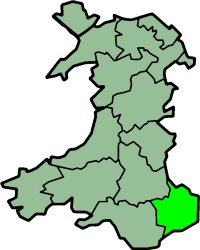This is an old revision of this page, as edited by Owain (talk | contribs) at 08:37, 23 May 2005. The present address (URL) is a permanent link to this revision, which may differ significantly from the current revision.
Revision as of 08:37, 23 May 2005 by Owain (talk | contribs)(diff) ← Previous revision | Latest revision (diff) | Newer revision → (diff)| Monmouthshire county | |
|---|---|

| |
| Geography | |
| Area: - Total - % Water |
Ranked 7th 850 km² ? % |
| Admin HQ: | Cwmbran |
| ISO 3166-2: | GB-MON |
| ONS code: | 00PP |
| Demographics | |
| Population: - Total (April 29, 2001) - Density |
Ranked 18th 84,885 100 / km² |
| Ethnicity: | 97.5% White |
| Welsh language: - Any skills |
Ranked 22nd 12.9% |
| Politics | |
| Monmouthshire Council http://www.monmouthshire.gov.uk | |
| News | |
| Monmouth Town Online Magazine http://www.towncrier.org.uk | |
| Control: | Conservative Party |
| MPs: | David Davies Jessica Morden |
Monmouthshire (Welsh: Sir Fynwy) is a county in south-east Wales. The current administrative area was created in 1996 and covers the eastern half of the traditional county - namely the following towns:
It was formed on April 1, 1996 as a successor to the previous district of Monmouth along with a small part of the former Blaenau Gwent district.

The traditional county of Monmouthshire includes Newport, and borders Gloucestershire, Herefordshire, Brecknockshire, and Glamorgan. The administrative county of Gwent, which existed from 1974 to 1996, covered this area almost exactly. The traditional county also includes the exclave of Welsh Bicknor, locally situate a short distance east of Monmouthshire's east border, sandwiched between the borders of Gloucestershire and Herefordshire. For administrative purposes this has been part of Herefordshire since 1844.
Monmouthshire's Welsh status was ambiguous until 1974 when the area (as Gwent) was specifically incorporated into Wales as part of a local government reform. Previously the legal formula had been to refer to 'Wales and Monmouthshire'. In popular usage it had been considered part of Wales for many centuries. The ambiguity surrounding its status arose from its not being mentioned in the second Act of Union between England and Wales in the 16th century. The 1911 Encyclopædia Britannica unambigiously described the county as part of England, but notes that 'whenever an act is intended to apply to alone, then Wales is always coupled with Monmouthshire'.
However, this is to some extent a legal fiction. The 'Act of Union' (strictly the 'Statute of Wales') made the whole of Wales part of England and so it did not define Monmouthshire as different to the other twelve Welsh counties. The question of Monmouthshire's status continued to be a matter of discussion, especially as Welsh nationalism and devolution climbed the political agenda in the 20th century: nonetheless, in the rare event that an Act of Parliament was restricted to Wales, Monmouthshire was always included, and the creation of the Welsh Office in 1964 explicitly included Monmouthshire. For administrative reasons, the question was clarified in law by an Order in Council of 1968 and further clarified by the Local Government Act of 1972.
| Principal areas of Wales | |
|---|---|
| Areas | |
| Lists | |